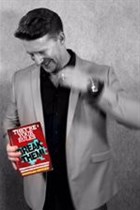
Top stories


ESG & Sustainability#BudgetSpeech2026: SRD grant unchanged, other Sassa social grants see hike
9 hours



More news












ESG & Sustainability
South Africa’s carbon tax should stay: climate scientists explain why









Even if you are not an especially squeamish or puritanical viewer, the erasure of characters in Game of Thrones is as explicitly graphic as it is sudden and unexpected. And therein lies at least part of the reason why the books and the TV series are so phenomenally successful. No, it’s not the gore. It’s the fact that they are utterly unpredictable.
The good guys don’t necessarily win. The bad guys don’t necessarily lose. You will loathe a certain character in the first season for being a scoundrel, and then be rooting for him by season 4. Upheaval and disruption rocks the storyline at every turn, which makes it one of the least formulaic productions around. You simply don’t know who’s going to prevail and you don’t know who’s going to die next. And that keeps fans coming back for more.
The awards garnered by Game of Thrones are becoming too numerous to mention. In its first season alone, it received 13 Emmy nominations. So why is it so attractive for a story to defy conventions and, in a sense, ‘betray’ reader expectations?
In Made to stick: Why some ideas survive and others die, authors Chip and Dan Heath describe the powerful communication technique of ‘breaking people’s guessing machines.’ In order to make communication – any kind of communication – genuinely riveting, simply organise the information into a mystery. It can be done with something as traditionally dusty as a university lecture, and George R.R. Martin certainly did it in a medieval fantasy about warring kingdoms. It can even be done in a sales pitch.
In Adam Grant’s Originals: How non-conformists move the world, Babble founder Rufus Griscom is described giving a completely counterintuitive presentation as part of a sales pitch. He headlined his slide: ‘Five reasons you shouldn’t buy Babble,’
And there was no trick implied. The presentation covered precisely these ideas, and not in an ironic way. He went into detail about the obstacles the company was facing, and described why these hurdles could be a difficulty to investors.
So why did it work (and work it did!)? The answer is two-fold.
Initially, the novelty factor drew attention. How do you not listen to a presentation like that? Secondly, the executives evaluating the presentation were basically being covertly invited to problem-solve. ‘That’s not so bad!’ they would say, psychologically bypassing the ‘should we or shouldn’t we?’ step and going straight into assumptive ownership. They then began discussing ways of overcoming the obstacles. It became a challenge to their abilities.
In all of these cases, the approach has been to break accepted conventions in order to ‘break the guessing machine’ of the audience. The net result is heightened engagement, sustained curiosity and delight upon the reveal of the ‘answer.’ When you depart from the accepted formulas of communication, you create cognitive dissonance. The audience (despite themselves, in the case of Thrones viewers who might not actually like violence), have to know how this will turn out.
Rules can create set expectations. When you break and betray the rules, the level of anticipation remains high. In communication, surprise is effective and often attractive. Does your brand ever surprise? Or is it constantly communicating in ways that are so predictable as to be sedating?
In your pitches and presentations, does your copy stand out? Or suffer death-by-sameness? What might you accomplish if you tampered with the rules on purpose, in order to up-end expectations? Do you have what it takes to break the human guessing machine? If you do, you just might achieve true brand distinction.
